Eric E. Wright's Blog, page 40
August 2, 2013
Aging and Envy
I leaned back on our living room sofa, and gazed through the skylight. The leaves on the to p-most branches of a majestic white birch fluttered in the breeze. But wait! Something was wrong. Some of the branches were dying. Our beautiful birch has a disease called, birch die-back.
p-most branches of a majestic white birch fluttered in the breeze. But wait! Something was wrong. Some of the branches were dying. Our beautiful birch has a disease called, birch die-back.
I feel more and more like that aging birch. A decade and a half ago doctors found blocked arteries that were inoperable. That stopped all hiking. As the years went by, sleeping through a whole night became a memory. Then came more frequent visits to the dentist and the optometrist. Now arthritic knees has rendered my daily walk painful or non-existent.
Don’t misunderstand me. I know my distress cannot compare to those who endure debilitating diseases. I view those who bear chronic disability or terminal cancer with cheerfulness as true heroes. I’m in awe of them.
But to be honest, this whole aging business is challenging. I always expected to burn out rather than rust out. Obviously, I need perspective, especially when I see youth people, even people in their forties and fifties, in vibrant health. Running. Hiking. Cycling. Canoeing. Playing hockey. Traveling the world. It’s not fair.
I think that’s envy talking. And envy clouds reality, stifles joy, shrivels thankfulness, and throttles praise. Proverbs 14:30 warns us that; “Envy rots the bones.” I sure don’t need any more deterioration in that area. Envy corrodes the heart and distorts all motivation. Envy led Cain to kill his brother, Joseph’s brothers to sell him into slavery, and the priests and Pharisees to betray Christ. “For where you have envy and selfish ambition, there you find disorder and every evil practice”(James 3:16).
How should I handle envy? Just stop moaning and face the facts? Okay, but a little help please. Fortunately God has promised help. “Even to your old age and gray hairs I am he, I am he who will sustain you….I will carry you.” (Isaiah 46:4).
How will He sustain us? By His Spirit who lives within us. As we live in dependence on the Spirit, He will replace envy and all the dark machinations of the sinful nature with the loving fruit of the Spirit. (See Gal. 5:19-26.) “Love is patient, love is kind. It does not envy”(1 Cor. 13:4). Do I love young people? Do I love those who can do what I can’t do? Can I give thanks to God for all I was able to do when I was youn g and all that others are now able to do?
g and all that others are now able to do?
As we yield to the Spirit, he will help us, on the one hand, to face reality without losing hope. We live in a fallen world among dying people. As the writer of Ecclesiastes reminds us, there will come a time; “when strong men stoop [arthritis], when the grinders cease because they are few, [loss of teeth], and those looking through the windows grow dim; [poor eyesight], when…the sounds of grinding [of a mill] fades [hearing weakens] …and desire no longer is stirred [libido dwindles]“(Eccl. 12:3,4,5).
Even as the Spirit enables us to face the facts, He counters morbidity by giving us a vision of eternity. Although, “all men are like grass…the grass withers and the flowers fall;” yet of believers in Jesus it is said, “You have been born again, not of perishable seed but imperishable”(1 Peter 1:24, 23). Our soul will pass through the vale untouched by mortality. Jesus will welcome us to our eternal home where “there will be no more death or mourning or crying or pain” (Rev. 21:4). This h eavenly vision, through the Spirit, will counter our natural tendency to become grouchy, and sad. And in the process, we may be able to encourage the younger generation to cherish their health and the opportunities for service it provides. “Remember your Creator in the days of your youth, before the days of trouble come and the years approach when you will say, I find no pleasure in them”(Eccl.12:1).
eavenly vision, through the Spirit, will counter our natural tendency to become grouchy, and sad. And in the process, we may be able to encourage the younger generation to cherish their health and the opportunities for service it provides. “Remember your Creator in the days of your youth, before the days of trouble come and the years approach when you will say, I find no pleasure in them”(Eccl.12:1).
I’ll intersperse future blogs about bear sightings and growing where we’re planted with several more meditations on aging.


July 22, 2013
Our Gallant Trees
The other day I was walking with a friend through our grove of trees to the stream at the back of our property. As his eyes followed the trunks of several of our giants to its crown high above, he exclaimed, “Wow, these are magnificent! Is that another white pine? Look at that cluster of cedars!”
 After having lived here for eight years or so, seeing our grove of mature trees through the eyes of a visitor brought back some of the excitement I felt when we first bought the place. Our house is nestled in a lawn and garden surrounded by a grove of mature trees: sugar maple, beech, red oak, white pine, hemlock, ironwood, cedar. The trees must be 60 or 70 years old or more.
After having lived here for eight years or so, seeing our grove of mature trees through the eyes of a visitor brought back some of the excitement I felt when we first bought the place. Our house is nestled in a lawn and garden surrounded by a grove of mature trees: sugar maple, beech, red oak, white pine, hemlock, ironwood, cedar. The trees must be 60 or 70 years old or more.
I love these trees, not just because I studied forestry as an undergraduate and can see their value in board feet of lumber, but because they are magnificent in their own right. And because they reflect the Creator who made them. I feel quite poignant about them, now that we have the property up for sale and plan to move into town. Leaving this spot that has inspired scores of blogs will be bittersweet. Fortunately, I’ll carry memories and the determination to live out the lessons they teach.
God of the gallant trees,
Give to us fortitude;
Give as thou givest to these
Valorous hardihood.
We are the trees of thy planting O God,
We are the trees of thy wood.
Now let the life-sap run
Clean through our every vein.
Perfect what thou hast begun,
God of the sun and rain,
Thou who dost measure the weight of the wind,
Fit us for stress and for strain.
(Amy Carmichael)
As these trees depend on God for sun and rain, so may I depend on the Lord to sustain my spiritual life through the indwelling Holy Spirit. May I develop fortitude to face patiently and quietly the stresses of life. May I bend beneath trials and troubles but not break.
“God is our refuge and strength”(Ps. 46:1) “Therefore my dear brothers stand firm. Let nothing move you”(1 Cor. 15:58). “I pray that out of his glorious riches he may strengthen you with power through his Spirit in your inner being” (Eph. 3:16).


July 11, 2013
Shelter From Storms
Wisely, birds build their nests in sheltered places. Our robins build their nests either on the timbers beneath our deck or on a gable sheltered by our roof. Wrens chose to build theirs in a dense tangle of vines beneath an overhang on house.
Birds prepare for the eventuality of storms. Terrible storms—hurricanes, tornadoes, and torrential rains—have bat tered much of the world this year. Nothing could prepare Toronto this past weekend for the historic torrents of rain that flooded the whole city. But we can learn from storms. When Hurricane Hazel blasted Ontario in 1954 and flooded the Humber River valley, 81 people lost their lives and there was 137 million dollars in property damage. As a result municipalities on river valleys in Ontario passed legislation banning the building of homes on most river valleys and flood plains.
tered much of the world this year. Nothing could prepare Toronto this past weekend for the historic torrents of rain that flooded the whole city. But we can learn from storms. When Hurricane Hazel blasted Ontario in 1954 and flooded the Humber River valley, 81 people lost their lives and there was 137 million dollars in property damage. As a result municipalities on river valleys in Ontario passed legislation banning the building of homes on most river valleys and flood plains.
Experience tells us that it is foolish to build on a flood plain, or as Jesus warned, on sand. It is just as foolish to be unprepared for the emotional and spiritual storms that will inevitably batter our lives.
Our friends or family may become for us the help and encouragement we need during times of trial or pain. And when friends and family need us, we should provide the same support to them. We should also express concern and offer practical help to suffering neighbours.
 But in a fallen world where selfishness reigns, where misunderstandings abound, and where most seem oblivious to the pain we feel inside, there is one place where we can always find shelter. The slings and arrows of outrageous fortune may fly all around us. We may be tested and tried beyond our limits. No one may hear our silent cry for help—but One Person. But that One is always attentive to our cries.
But in a fallen world where selfishness reigns, where misunderstandings abound, and where most seem oblivious to the pain we feel inside, there is one place where we can always find shelter. The slings and arrows of outrageous fortune may fly all around us. We may be tested and tried beyond our limits. No one may hear our silent cry for help—but One Person. But that One is always attentive to our cries.
The book of Psalms abundantly testifies to that reality. “Blessed are all who take refuge in him [the Son]” (Psalm 2:12). “O Lord my God, I take refuge in you”(Psalm 7:1). “The Lord is a refuge for the oppressed, a stronghold in times of trouble”(Psalm 8:9). “The Lord is my rock, my fortress and my deliverer; my God is my rock, in whom I take refuge. He is my shield and the horn of my salvation, my stronghold”(Psalm 18:2). Ira Sankey put this truth to music;
The Lord’s our Rock, in Him we hide,
A shelter in the time of storm;
Secure whatever ill betide,
A shelter in the time of storm.
Oh, Jesus is a Rock in a weary land…a shelter in the time of storm.
Do we find ourselves assailed by storms of pain or doubt, discouragement or worry? Let’s find refuge in the arms of Jesus.


July 4, 2013
Like the Primrose – Loving Light, Hating Darkness
Our yellow evening primrose, like several flowers in our garden closes as the night approaches and opens in the morning with the sun. The primrose reminds me of the sensitivity Christians should have toward godliness and 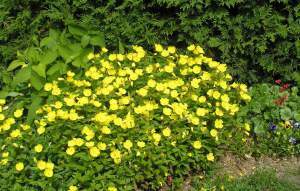 the revulsion we should express for evil.
the revulsion we should express for evil.
In Scriptural imagery, God is light and in Him is no darkness. (See Ps. 27:1, Ps. 84:11). Light signifies the utter holiness of God and the standards He calls us to live up to; a life of purity, holiness and goodness. By contrast, darkness signifies evil, sin, disobedience, and moral corruption of any kind.
Unfortunately, from birth, we have a proclivity to embrace that which is dark and sinful. “This is the verdict: Light has come into the world but men loved darkness instead of light because their deeds were evil”(John 3:19).
Jesus came as a light shining in darkness to destroy the works of darkness and call people to walk in the light. Aged Simeon held the baby Jesus in his arms and quoted Isaiah; “My eyes have seen your salvation…a light for revelation to the Gentiles and for glory to your people Israel”(Luke 2:30,32).
How do we, like the primrose, develop a sensitivity that distinguishes light from darkness? With the primrose this is natural. With us it is unnatural. So first, as Jesus said, we must be born again, made new, delivered from bondage to darkness. (See John 3) Then secondly, we must commit ourselves to absolute obedience to God’s principles. Those principles define holiness. Thirdly, we must fill our minds with those righteous principles through daily meditation on God’s Word. As we immerse ourselves in the Scriptures and daily apply what we learn, the Holy Spirit trains us to discern good and evil. He retrains our corrupted consciences to express alarm in the presence of evil.
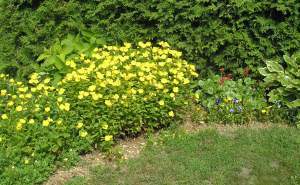 Our cultures bombard us with propaganda that distorts good and evil. So often evil is proclaimed as if it was something wonderful; drinking, free love, gambling, borrowing beyond our capacity to repay–for example. To withstand the flood of moral turpitude inundating our countries, we desperately need to become hyper-sensitive to good and evil. Popular or not, may God help us to love the light and hate the darkness.
Our cultures bombard us with propaganda that distorts good and evil. So often evil is proclaimed as if it was something wonderful; drinking, free love, gambling, borrowing beyond our capacity to repay–for example. To withstand the flood of moral turpitude inundating our countries, we desperately need to become hyper-sensitive to good and evil. Popular or not, may God help us to love the light and hate the darkness.


June 24, 2013
The Fragrance of a Fruitful Life
Soon the squirrels will be scouring the walnut, oak and beech trees for their nuts. 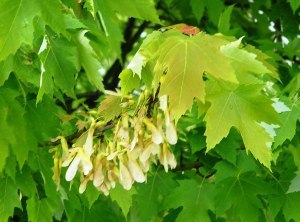 In the flower garden, pods have begun to develop on iris, columbine, and even the smiling pansies. Everything that grows pours its energy into producing seed that will perpetuate the species. While I don’t seem able to grow any decent radishes, the plants are keen to produce seed pods. And how could we enjoy summer without strawberries and corn, cherries and melons, peaches and green beans?
In the flower garden, pods have begun to develop on iris, columbine, and even the smiling pansies. Everything that grows pours its energy into producing seed that will perpetuate the species. While I don’t seem able to grow any decent radishes, the plants are keen to produce seed pods. And how could we enjoy summer without strawberries and corn, cherries and melons, peaches and green beans?
What about fruit in the spiritual realm? “Are we fruitful?” As Jesus makes clear, fruitfulness distinguishes those who are truly His disciples. “Watch out for false prophets.…By their fruit you will recognize them. Do people pick grapes from thorn bushes, or figs from thistle? Likewise every good tree bears good fruit, but a bad tree bears bad fruit. …Every tree that does not bear good fruit is cut down an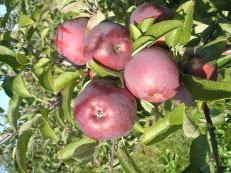 d thrown into the fire”(Matt. 7:15-20). In verse 21 of this passage, Jesus clarifies that, in this context, fruitfulness is doing the will of the Father.
d thrown into the fire”(Matt. 7:15-20). In verse 21 of this passage, Jesus clarifies that, in this context, fruitfulness is doing the will of the Father.
The will of the Father includes many things; central among them is that we believe in Jesus Christ as our Savior. (See John 6:40, 3:15,16) In a moral sense, the ten commandments define God’s will for us, as do the commandments and teachings of Jesus which further illuminate the moral law. In terms of what we believe, we are fruitful if we believe what is true as revealed by God. Otherwise, as Jesus said in Matthew seven, we are false prophets. But beyond being true and right in our beliefs there must be love.
In essence, to be fruitful is to be loving. “Love the Lord your God with all your heart and with all your soul and with all your mind.…and love your neighbor as yourself”(Matt. 22:37,39). Hence, a fruitful person is one who is ravished by God’s love and expresses that love for God—Father, Son and Holy Spirit—deeply and sincerely. He is also one who is loving, forgiving, and compassionate in all his relationships with other people.
Paul further identifies the various facets of spiritual love as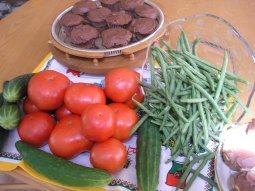 joy, peace, patience, kindness, goodness, faithfulness, gentleness and self-control. (Gal. 5:22,23) A life manifesting this kind of fruitfulness is influential. It lights up the place where the loving person lives. (Matt. 5:13-16) It raises questions in those who are not Christian. “Always be prepared to give an answer to everyone who asks you to give the reason for the hope that you have”(1 Peter 3:15).
joy, peace, patience, kindness, goodness, faithfulness, gentleness and self-control. (Gal. 5:22,23) A life manifesting this kind of fruitfulness is influential. It lights up the place where the loving person lives. (Matt. 5:13-16) It raises questions in those who are not Christian. “Always be prepared to give an answer to everyone who asks you to give the reason for the hope that you have”(1 Peter 3:15).
Living things produce fruit in order to reproduce their species. While Christians should bear fruit to glorify God, that process of glorifying God should result in others being attracted to the gospel of grace. Maybe we all can’t be soul-winners, but we all should be so attractive that non-Christians seek us out as bees seek out the sweet nectar in flowers. Let’s pray to that end and be prepared to give a reason for our faith in Christ.


May 31, 2013
Too Busy to Stop and Listen?
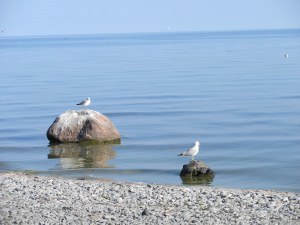 Every day I make a list of what I hope to do. And spring is a busy time, so I have long lists. Lawn to fertilize. Perennial beds to cultivate. Trash to burn. Seeds to plant. And on it goes.
Every day I make a list of what I hope to do. And spring is a busy time, so I have long lists. Lawn to fertilize. Perennial beds to cultivate. Trash to burn. Seeds to plant. And on it goes.
For my office I also have lists. I’m so list-conscious, I find it difficult some mornings to sit quietly and meditate on God’s Word, draw out an application and listen for the voice of the Spirit. It takes discipline to quietly count my blessings and lift my heart in worship. My list makes me itchy to get going. My mind is going off in a dozen different directions. Those flowers that need planting. The article to write. The repair job. The chapter to revise. The bill that needs paying. The letter to be written.
A-a-gh, mind stop 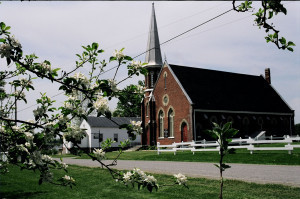 wandering. Relax. Be quiet. Be open. Let God whisper to your soul.
wandering. Relax. Be quiet. Be open. Let God whisper to your soul.
I’m way too action-oriented. Too bound by to-do-lists. Do you have that problem? Now, I wouldn’t want to slouch through each day doing nothing constructive, but I wonder sometimes if I’m too addicted to crossing off completed tasks on my list. As if my sense of worth is dependent on how many tasks I can complete, not the quality of the tasks: quantity not quality.
In order to be wise about what we do, we need to have a sense of God’s priorities. For that we need to learn to listen in quietness to His voice. Does not the Psalmist write, “He leads me beside the quiet waters.” And it is beside those quiet waters that “He restores my soul” and gives direction. Does God not say, “Be still and know that I am God,” and “When you are on your beds, search your hearts and be silent”. (See Psalm 23, Psalm 46:10, Psalm 4:4).
The Lord Jesus had a much more crucial to-do-list than anyone could ever have, 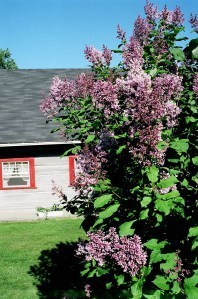 but he left his disciples and the crowds and went up on a mountain to be quiet and pray. (See Matt. 14:23.) From earliest times, God established the sabbath principle, that we should set aside one day in the week to come apart, to worship, to rest, to be quiet and listen to his voice. That doesn’t mean we should fill the whole day with church activities.
but he left his disciples and the crowds and went up on a mountain to be quiet and pray. (See Matt. 14:23.) From earliest times, God established the sabbath principle, that we should set aside one day in the week to come apart, to worship, to rest, to be quiet and listen to his voice. That doesn’t mean we should fill the whole day with church activities.
We desperately need to program times of quietness, periods free from activity, seasons when we lift our hearts heavenward. Times to be still; to listen. Workaholism is not valued in heaven.


May 21, 2013
Giving Thanks for Green
For months the landscape lay grey and brown, ochre and dun. Prison grey. Dirt brown. Grey trees lifted imploring fingers toward the wane sun. Tattered brown blankets wrapped the fields in slumber. Even the evergreens—the spruce and pine and cedar—straggled into spring in tarnished dresses of dingy oli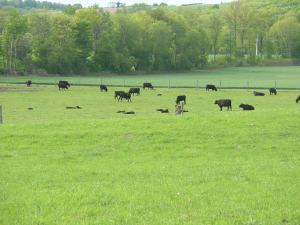 ve-drab.
ve-drab.
Then spring came, and green burst out all over. Grey days quickly become magical green days. Every morning became an Amen of praise to the Divine Artist, a gentle symphony of awakening life heralded by the blush of spreading green. Gentle green. Subtle. Fresh. Vibrant. In a myriad of soothing shades.
Ponder the miracle. Almost overnight grey was banished from the fields of winter wheat. The ditches come alive with shoots of green. The crocuses flowered. Tulips and daffodils brightened the brown border. Wildflowers rose from the litter. The twigs of all the forest trees, according to a timetable choreographed by the Creator, began to swell and stretch. Slowly, the leaves unfurled and stretched toward the warming sun.
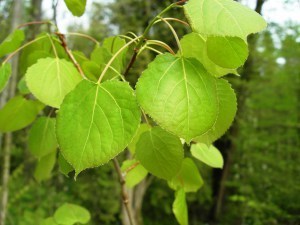 Spring is like a smile, suddenly transforming a face tight with sadness. Or a subtle blush spreading on the face of a young woman at the sight of her beloved.
Spring is like a smile, suddenly transforming a face tight with sadness. Or a subtle blush spreading on the face of a young woman at the sight of her beloved.
Every spring I’m bursting with thankfulness for . . . green, yes, green, as a pigment, green as a symbol of life and hope. What would our world be without its soothing shades? And yet in the few short weeks since this resurrection has occurred, I tend to forget—take it for granted, like so much else that comes from the Creator’s Hand.
Forgive me Father for everything I take for granted! And now that I think of it, what about blue, the colour of sky and water, red that announces cardinal and rose, orange the hue of pumpkin and tangerine, and violet the colour of lilac and amethyst?
If I take colour for granted, what about apples and zebras, bread and butter, coffee and x-rays, dandelions and water? Paul wrote, “Always giving thanks to God the Father for everything, in the name of our Lord Jesus Christ”(Eph.5:20). Clearly, I’ve got a long way to go before I reach the borders of thanksgiving country.
From Philippians we learn that a dearth of prayer laced with thanksgiving 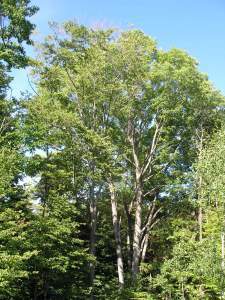 promotes anxiety.(Phil. 4:6) Colossians teaches us that “overflowing in thanksgiving” acts as a catalyst to encourage our growth in Christ.(Col. 2:7) Colossians also links vigilance to thankfulness.(Col. 4:2) Failing to count our blessings, to name them one by one, makes us careless, spiritually lazy, and dangerously naïve—the dark territory into which I stray too often.
promotes anxiety.(Phil. 4:6) Colossians teaches us that “overflowing in thanksgiving” acts as a catalyst to encourage our growth in Christ.(Col. 2:7) Colossians also links vigilance to thankfulness.(Col. 4:2) Failing to count our blessings, to name them one by one, makes us careless, spiritually lazy, and dangerously naïve—the dark territory into which I stray too often.
And so, Lord, help me to be thankful for the simple things—all the things I take for granted—including all the colours of the rainbow, but especially green. (Check out Psalm 136) For further inspiration thoughts drawn from nature see Through A Country Window or Down a Country Road at: http:www.countrywindow.ca


May 14, 2013
A World of Explosive Potential
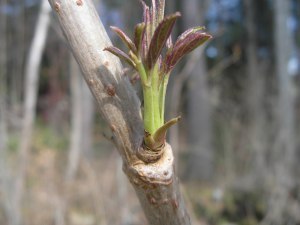 Scant weeks ago, the deciduous hillsides stood lifeless, clothed in their brown and grey winter cloak. As the sun rose higher, it sparked a resurrection. In the buds at the ends of maple and poplar and oak branches, sap tickled forth life. The buds began to swell. And in scant days tiny new leaves split open their winter cocoons and peeked forth.
Scant weeks ago, the deciduous hillsides stood lifeless, clothed in their brown and grey winter cloak. As the sun rose higher, it sparked a resurrection. In the buds at the ends of maple and poplar and oak branches, sap tickled forth life. The buds began to swell. And in scant days tiny new leaves split open their winter cocoons and peeked forth.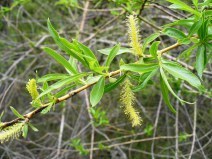
We’re so used to this happening every spring, we think nothing of it. But when we look closer it seems miraculous. How could those dry, scaly buds—each bud distinctive, by the way—have the potential within them for such delicate new leaves to form? How did the Creator craft such a thing? A package so tiny and yet so resistant to winter’s frigid breath that it could contain the embryos of the miraculous food factories that leaves become?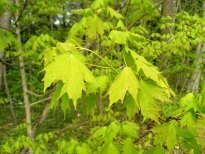
Now as I look out my window, a myriad subtle shades of green clothe the hillsides in a cloak much fancier than Joseph’s coat of many colours.
Actually, the miraculous mantle of green we now see all around us is but one example of a world full of explosive potential. And most of that latency has been packaged by the Creator in miniscule capsules. A piece of fluff that becomes a giant cottonwood 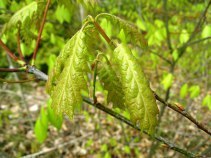 tree. An acorn that grows into a mighty oak. A tiny seed that morphs into a plant yielding mouth-watering tomatoes. A drop of water that becomes a snowflake.
tree. An acorn that grows into a mighty oak. A tiny seed that morphs into a plant yielding mouth-watering tomatoes. A drop of water that becomes a snowflake.
And what of an embryo that develops into a baby? Each baby is born with astonishing potential. Will he or 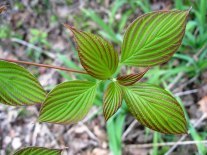 she grow into another Einstein, a Michelangelo, an Alexander Graham Bell, or a Florence Nightingale? More important, will that child become a person full of love and compassion who adopts orphans, or stands up for the downtrodden, or reaches out to a tribe living in superstitious fear. Often those with the least promising start in life and the most disabilities surprise us with their potent talents.
she grow into another Einstein, a Michelangelo, an Alexander Graham Bell, or a Florence Nightingale? More important, will that child become a person full of love and compassion who adopts orphans, or stands up for the downtrodden, or reaches out to a tribe living in superstitious fear. Often those with the least promising start in life and the most disabilities surprise us with their potent talents.
What about the potential for good in a kind and encouraging wor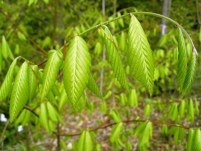 d? The possibility that dawns with each new day? The potency of a prayer uttered in desperation and faith? Even the possibility contained in a 140 character tweet—for good or ill? The power of an idea? The uplifting effect of love, the soothing power of forgiveness, or the encouragement found in a hug?
d? The possibility that dawns with each new day? The potency of a prayer uttered in desperation and faith? Even the possibility contained in a 140 character tweet—for good or ill? The power of an idea? The uplifting effect of love, the soothing power of forgiveness, or the encouragement found in a hug?
None of these top the potential in a simple message, the good news of the gospel. It’s about the Son of God came and dwelt among us, died in our place for our sins, was buried and rose again the third day. He is now seated at the Father’s right hand from 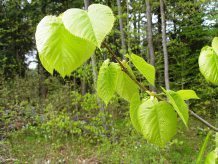 where he will return. It’s good news because, the moment we really believe Jesus and his mission, we are transformed—born again. Our slide into the mire and muck of our own potent selfishness is halted and rise up to begin our ascension of a mountain of new possibilities.
where he will return. It’s good news because, the moment we really believe Jesus and his mission, we are transformed—born again. Our slide into the mire and muck of our own potent selfishness is halted and rise up to begin our ascension of a mountain of new possibilities.
All over the world from Ethiopia to India to Indiana, people a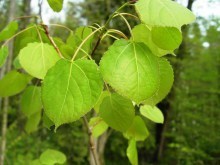 re being turned right side up by its simple but dynamic power. That happened to me when I was 19. I hope and pray it is your experience. If not ask Jesus right now to come into your heart and become your Savior and Lord.
re being turned right side up by its simple but dynamic power. That happened to me when I was 19. I hope and pray it is your experience. If not ask Jesus right now to come into your heart and become your Savior and Lord.


April 30, 2013
How Surroundings Affect our Attitudes
Both Mary Helen and I try to walk every day for exercise. I use a chain saw to 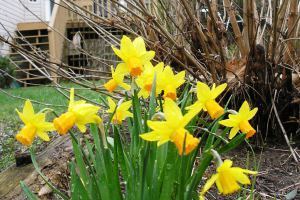 clear dead trees from our property. But both of us have found our activities severely limited due to arthritic knees and, in my case, a right shoulder problem that seems untreatable. To be candid, frustration and discouragement cloud the horizon. Our to-do-lists remain long.
clear dead trees from our property. But both of us have found our activities severely limited due to arthritic knees and, in my case, a right shoulder problem that seems untreatable. To be candid, frustration and discouragement cloud the horizon. Our to-do-lists remain long.
One glance outside, 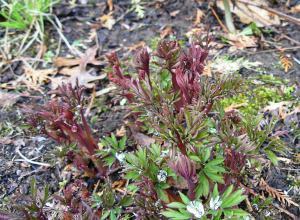 however, lightens the mood. The grass is greening. The yellow faces of the daffodils smile at the sun. Everything is on tiptoe, ready to burst into bloom. Tulips and hyacinth. Maple, beech, ash and aspen. What seemed to be bare patches of dirt a week ago, now boast tiny tendrils of perennials I’d forgotten—delphinium, aster, foxglove, coneflower, fiesta flower, and hosta.
however, lightens the mood. The grass is greening. The yellow faces of the daffodils smile at the sun. Everything is on tiptoe, ready to burst into bloom. Tulips and hyacinth. Maple, beech, ash and aspen. What seemed to be bare patches of dirt a week ago, now boast tiny tendrils of perennials I’d forgotten—delphinium, aster, foxglove, coneflower, fiesta flower, and hosta.
How can one be gloomy in the spring? It’s really quite amazing what a profound 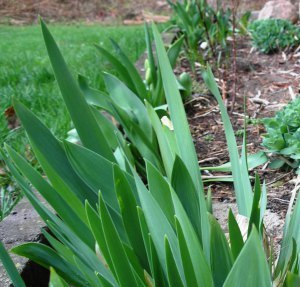 effect our surroundings have on our moods. Looking back, I can understand why many suffer from seasonal affective disorder during the winter. Not only is daylight reduced but the fields and forests seem drab and dead. What must it be like to live in a prison surrounded by concrete with no view of lawns or woods? And I often wonder how people endure living in ramshackle slums or even in concrete and glass high-rise buildings.
effect our surroundings have on our moods. Looking back, I can understand why many suffer from seasonal affective disorder during the winter. Not only is daylight reduced but the fields and forests seem drab and dead. What must it be like to live in a prison surrounded by concrete with no view of lawns or woods? And I often wonder how people endure living in ramshackle slums or even in concrete and glass high-rise buildings.
Surely, humans created to live in the Garden of Eden and destined, through faith in Christ, to end 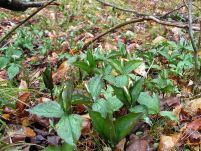 up in a garden in paradise, need gardens and parks to feel at home in this world. Every city development needs adequate and attractive parkland. I seriously wonder whether prisoners would be more likely rehabilitated if they had more exposure to the gentle influence of grass and flowers.
up in a garden in paradise, need gardens and parks to feel at home in this world. Every city development needs adequate and attractive parkland. I seriously wonder whether prisoners would be more likely rehabilitated if they had more exposure to the gentle influence of grass and flowers.
Our daughter, Debbie, had struggled for months with the debilitating effects of a concussion. During this time she prayed for the Lord to lift her spirits in some way. He sent her several pairs of cardinals. Intrigued at their gorgeous red plumage, she began to put out bird seed attracting other birds. She, who had 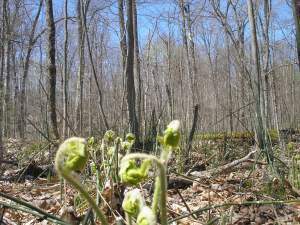 never been a bird watcher, felt herself uplifted.
never been a bird watcher, felt herself uplifted.
Not all have the opportunity to choose their surroundings. As many of God’s imprisoned and tortured saints have testified, God Himself can draw near in the ugliest of environments. “Lo I am with you always.” “Yea, though I walk through the valley of the shadow of death, thou art with me.” The unalloyed presence of God is enough.
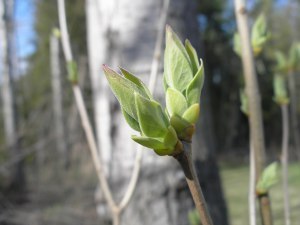 And yet God created us with five senses so we could experience a sensual world. He created a plethora of flowers and butterflies, birds and fish, sea-shells and pebbles, rainbows and cloud formations to be enjoyed. Embracing the varied beauty of our world enables us to rise above our immediate pains and problems to soar in our spirits on wings of hope.
And yet God created us with five senses so we could experience a sensual world. He created a plethora of flowers and butterflies, birds and fish, sea-shells and pebbles, rainbows and cloud formations to be enjoyed. Embracing the varied beauty of our world enables us to rise above our immediate pains and problems to soar in our spirits on wings of hope.


April 11, 2013
THE WAITING SEASON-Acquiring patience in unsettled weather
Some months should be accepted as months dedicated to acquiring patience. In northern climes, during March and April we wait—often impatiently. We wait for winter to leave and for the temperature to climb. The sun shines brightly for a few days, then snow flurries come again, as they have today.  Our crocuses and snowdrops valiantly try to bloom. This year has tried the patience of most of us.
Our crocuses and snowdrops valiantly try to bloom. This year has tried the patience of most of us.
November and part of December are waiting months too. Waiting for winter, the real winter with snow. Waiting. Whether in the early spring or late fall we are often found waiting for perfect weather. Fortunately, we have the Easter holidays to distract us in the spring and Christmas to look forward to in the late fall. Otherwise, there’s not much to do outside in these shoulder seasons.
However, if we approach these prolonged in-between seasons with the right kind of attitude, we may come out of them with a healthy dose of patience! And without patience and perseverance we’ll spend much of our lives being frustrated. Consider how much we need these qualities: waiting for a bus, driving through traffic, bringing up children, getting through school, finding a job, developing a strong marriage, writing a book, painting a picture, or playing monopoly. We’ll never succeed in completing tedious and detail-oriented tasks without buckets of the stuff. Nor will we live a meaningful life.
No wonder the biblical writers say a lot about this character quality. In the parable of the sower and the soils, “the seed on good soil stands for those with a noble and good heart who hear the word, retain it, and by persevering produce a crop”(Luke 8:15).
 Jesus urges believers during the chaos coming near the end of the age; “in patience possess your souls” (Luke 21:19, KJV). This implies that without patience our souls are like unmanageable animals—wild mustangs who know nothing of saddle and bridle.
Jesus urges believers during the chaos coming near the end of the age; “in patience possess your souls” (Luke 21:19, KJV). This implies that without patience our souls are like unmanageable animals—wild mustangs who know nothing of saddle and bridle.
Both Romans 5 and James 1 affirm that, under the hand of God, suffering and tribulation help us develop the perseverance and patience we need to live victorious and fruitful lives. (See Rom 5:1-5; James 1:2-5). The writer of Hebrews urges us to “run with patience the race that is set before us”(Heb. 12:1).
The Scriptures were written “so that through endurance and the encouragement of the Scriptures we might have hope”(Rom. 15:4). It is interesting to note here that the wisdom and encouragement we acquire from the Scriptures enables us to endure unpleasant circumstances productively. The Scriptures give us the big picture, the long view. Without them we might find both the present and the future dark and foreboding.
Sitting still and lamenting our situation—or the weather—will not create the  patience we need to press ahead with life. “We do not want you to become lazy, but to imitate those who through faith and patience inherit what has been promised.”(Heb. 6:12). An active lifestyle helps to banish discouragement and depression.
patience we need to press ahead with life. “We do not want you to become lazy, but to imitate those who through faith and patience inherit what has been promised.”(Heb. 6:12). An active lifestyle helps to banish discouragement and depression.
I’ve gone far afield from talking about the uncertainty of April weather. And yet, I contend that there seems to be a relationship between cheerfully accepting whatever weather comes our way, and developing the patience and hope we need to live satisfying and productive lives.





